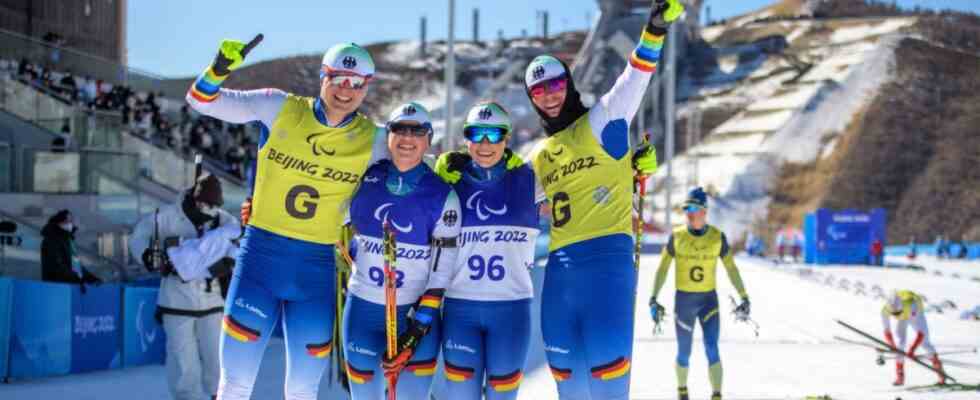The role model of the biathlete and cross-country skier Marco Maier was his competitor in the past few months. “He dominates the competition so much, it’s just phenomenal. I want to train so that I can get there,” Maier said about a year ago in the Sportschau interview about the Russian Wladislav Lekomtsev: “You can also learn a lot technically. With With one stick, Lekomtsev manages to cover the distances as quickly and effortlessly as possible. He runs up the mountains like some with two arms.”
Now, at the Paralympics in Beijing, Lekomtsev is among 71 Russian athletes banned over Russia’s war of aggression against Ukraine. And Maier, 22, from Oberstdorf, who is missing three finger joints on his left hand, was one of the four German medal winners on the opening day with a silver medal in the biathlon sprint at his first Paralympics. And that was just one example of the impressions under which these 13th Winter Games for people with disabilities began.
During the opening ceremony, Andrew Parsons called out “Peace” in his speech. Parsons, the President of the International Paralympic Committee (IPC), which initially wanted to allow Russia’s athletes and only changed under pressure from heavy criticism. The most impressive scenes of the ceremony in Beijing’s “Bird’s Nest” stadium took place in the catacombs: “Peace for Ukraine”, the Ukrainian team shouted in front of the cameras, competitors hugged the athletes and the moved committee head Valery Sushkevich. A total of 20 Ukrainian winter sports enthusiasts traveled to China despite the most adverse circumstances.
Protest in the catacombs: The Ukrainian team at the opening ceremony.
(Photo: Uncredited/dpa)
From now on it should be all about sport, that is the understandable wish of the associations and athletes. But the fact that the stories from Beijing can hardly be told without the history of the past few days was shown not least by the first German successes.
It was to be expected that flag bearer Anna-Lena Forster won the first medal, silver in the downhill of the monoskiers. Forster last won four gold medals at the World Championships in January, but her biggest competitor Momoka Muraoka from Japan, who won gold in Beijing, was still missing. Three medals at the biathlon in Zhangjiakou, alongside Maier, silver for Linn Kazmaier and bronze for Leonie Walter in the biathlon sprint for visually impaired athletes, that was a surprise. With one restriction, as national coach Ralf Rombach said: “Of course, after the Russian girls weren’t allowed to start, we figured something out.”
At the World Championships in Lillehammer in January, the top five places in the women’s biathlon sprint were taken by Russians, Kazmaier was sixth, places seven and eight went to Russians again, ahead of Walter in ninth place. The field on Saturday was reduced to nine biathletes.
At 15, Kazmaier is the youngest in the German team
The successes of the Germans were of course no less remarkable. Kazmaier, 15, is the youngest athlete on the German team. For Walter, 18, it’s also the first Paralympics. Both of them only made one mistake when shooting, which works by ear in the biathlon for the visually impaired: An infrared system uses an acoustic signal via headphones to show them how close they are to the target – the higher the tone, the closer to the center of the target.
“When I think about having a medal hanging around my neck tomorrow, I’m definitely happy, but I still can’t believe it to a certain extent,” said Kazmaier. Seven years ago she took part in a course in Nordic para skiing for the first time and has been a sports boarding student in Freiburg since last autumn. At the Paralympics, she just wanted to “gain some good experience,” she said a few days ago. She had hardly thought of award-winning successes, like the Olympic Games there are 15,000 euros for silver.
Biathlete Marco Maier.
(Photo: Jens Büttner/dpa)
Maier felt the same way, on the one hand. On the other hand, he had already finished a World Cup in Östersund at the end of January just 48 hundredths of a second behind the seven-time world champion Lekomtsev. And because the Russian received a time penalty for a jump start, Maier actually beat his role model back then.
Well, without Lekomtsev and the other Russians, the favorites were also missing in Maier’s field. But he left Canadian Mark Arendz behind, six-time medal winner in Pyeongchang 2018. “There were people at the start who represented the world level, he got involved, that was outstanding,” said national coach Rombach. Maier did not allow himself a shooting error, a review by the jury because of a spring pad bent forward had no consequences. And at the finish, only one athlete was faster: Grigory Vovchinsky, 33. He won the first medal of this Paralympics for Ukraine.

